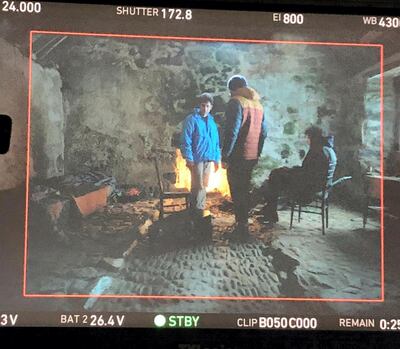Egyptian-British actor Amir El-Masry has praised Netflix's The One for avoiding stereotypical casting in its roles.
The Cairo-born, London-raised star suggests the screen adaptation of John Marr's best-selling novel – a psychological thriller about a company that pairs individuals based on DNA matches – is a victory for diversity.
In the eight-part series, starting on Friday, March 12, El-Masry plays Ben, a close friend of Rebecca, the on-screen founder of the technology company. However, he said it took a lot of convincing to keep the character’s "western" name after he got the role.
“For so long, the media has instigated this negative stereotype of us,” said El-Masry, at an online event for industry professionals hosted by MENA Arts UK. “It helps to be cast as a Mena person with the name Ben to widen the ideas of what Mena characters are, [which is] not just terrorists, refugees or prostitutes."

No longer in limbo
His recent nomination for Best Actor at the British Independent Film Awards for his lead performance in the critically acclaimed feature film Limbo suggests more promising changes in representation.
El-Masry plays Syrian refugee Omar in Ben Sharrock’s award-winning comedy-drama about four asylum seekers living on a remote Scottish island while they have their refugee claims processed.
It has been a darling of the film-festival circuit, premiering at the 2020 Toronto International Film Festival and receiving an Official Selection from the 2020 Cannes Film Festival.
He also received a special nod in his birthplace after Limbo scooped three awards at the Cairo International Film festival, including for Best Actor.
The awards are particularly significant, considering the thespian didn’t want to take the role on at first. “I didn’t want to play it initially because I thought it was a huge responsibility and, for selfish reasons, I didn’t want to be seen that way, when I felt like I was getting a little bit of traction,” he said at the event.
On-screen diversity challenges
Not wanting to be typecast is a common concern of non-white actors, but El-Masry was compelled to take the role after he saw the agency and personality given to his character in Limbo.
The success of the film has only added to the buzz that had been building up around him.
Since graduating from the UK's prestigious Lamda drama school, El-Masry has ratcheted up impressive acting credits, including in Jon Stewart's directorial debut Rosewater; the multi-award-winning series The Night Manager; Bafta-nominated The State; international hit Star Wars: The Rise of Skywalker; and the hugely successful BBC drama series Industry.
Conquering Hollywood of the East and West
The success El-Masry has had as an actor from the Middle East suggests promising developments, but he stresses it takes a lot patience.
“It takes a lot of time to open someone’s imagination a little bit, which is why you have to be present and meet people and work a lot harder than the average person who gets more auditions,” El-Masry said.
That’s partly why he has kept a firm foot in the Egyptian film industry - also known as the "Hollywood of the Orient" - and recently finished filming a movie in Cairo.
“It was an important decision I had to make early on to do both – you never know with this career and, if you speak both languages, why not keep your options open,” said El-Masry.
“The support back home in Egypt is so significant to keep me going and reminds me of having to be representative of that culture in terms of my work outside.”
It was, after all, a fellow Egyptian, a movie star no less, who helped him launch his career.
Meeting Omar Sharif
El-Masry told the online audience about how, when he was 17, his father engineered a sit-down with his screen idol Omar Sharif after spotting the Doctor Zhivago star in a cafe in Paris.
After buying a young Amir a Eurostar ticket from London, the father and son duo tracked the film legend down to his hotel to meet him. Sharif greeted his fan graciously, and gave the budding actor tickets to his film premiere, which is where El-Masry met the director who gave him his first role.
The film was about an Egyptian boy at an English school, and could not have been a more fortuitous opportunity.
“I had no idea how significant the role was going to be and was just grateful at the time for getting a foot in the door,” said El-Masry. As it turned out, the door was kicked wide open after his screen debut landed him the Best Young Actor Award at the Egyptian Oscars.
He has enjoyed a steady career ascent since then, but said there are still tough barriers for artists from the Middle East and North Africa region.
'Something like Bridgerton would be a lovely challenge'
It's a message he shares with the Bafta steering committee group he sits on, and it's why he is an active member of Mena Arts UK, which is fighting for official recognition in the UK industry.
For El-Masry, it’s not about whether or not actors should embrace the "Arabian typecast", but whether or not the character is important to the story’s narrative.
“Even if I’m not the most important person in that storyline, you still have to make yourself the centre of that narrative – even if it’s just one scene,” he said.
“My objective isn’t to break away from my heritage because I’m proud of how I look and where I’m from. I’m proud of being one of the people to fly that flag as well.”
Having said that, he would certainly like to take on a more diverse range of roles than is normally on offer. "I would love to be in a period drama, in a romantic setting, because I've never seen someone who represents us in that light – like Bridgerton – it would be a lovely challenge."
After a 12-year career, the actor says he is ready to take control of the narrative and is writing a series inspired by his experiences as a Mena actor. He calls it "a satire of things that have happened" and, given his prolific portfolio of work, he must have a bank of amusing situations to draw from.
The Friday Hangout: Mena Arts UK Takeover is a series of talks platforming industry professionals from the Mena+ region working in the live and recorded arts. More information is here.




